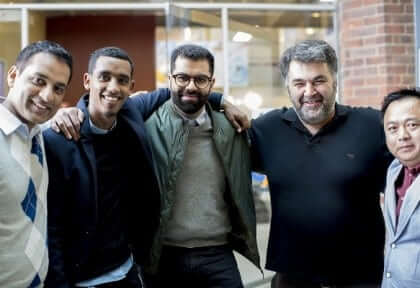An all-male panel discusses the challenges in engaging all Australian men on the issue of family violence
Not long ago, I was inspired by a ‘gender-unequal’ panel. This, of course, would never be acceptable in normal circumstances, as one of the panelists, Con Karapanagiotidis of the Asylum Seeker Resource Centre, pointed out. But this was no ordinary panel. Under discussion was a subject that has long been seen, puzzlingly, frustratingly, and dangerously, as only a ‘women’s issue’ – male violence against women.

Shoulder To Shoulder, organised by the InTouch Multicultural Centre Against Family Violence, brought together six male community leaders and activists (from CALD backgrounds) to discuss, without reservation, what drives men to violence, how men can change the behaviour of other men, and the need for all men to take a role in ending violence against women.
“We have blueprints, we have reports, we have conventions… but we still find ourselves, in 2016, having this conversation.” These opening words of Faye Spiteri, Chair of InTouch and mediator of the panel, went to the heart of the challenge we face in dealing with this issue; what we’ve been doing to date hasn’t worked, or been enough. Something needs to change. And we all need to be part of that change.
Alongside Con Karapanagiotidis were Jasvinder Sidhu of Jagriti Forum, Tarang Chawla of Justice for Nikita, Cuong La of Health West, Nuredin Hassan of ISIS Primary Care and Mark Zervaas of Victoria Police.

The panel discussion ranged from recognising male privilege and the benefits men derive from such societal advantage, to toxic masculinity and false images of the ‘real man’, to the need to raise boys to love themselves. We heard from all panelists of the need to make change at every level, from speaking out against everyday acts of sexism, to education about respectful relationships in schools, to funding for vital prevention and support services.
All the speakers were articulate, switched-on and unhesitant about placing men and gender inequality at the centre of this issue. As Karapanagiotidis so eloquently declared, “It might not be all men doing it, but it’s all men’s responsibility to be speaking out about this, and talking about this.”
Tarang Chawla spoke movingly of the day, Thursday 8 January, 2015, that his 23-year-old sister Nikita was murdered by her partner, stabbed 35 times with a meat cleaver in her sleep. But he also urged us to see domestic violence as the human issue it really is.

“I’m here because every man has a responsibility…not because of their mothers and sisters, their cousins and friends, but as human beings, to care for the welfare of those around us.”
Nuredin Hassan addressed all the men in the room directly: “One of the main reasons why a lot of men don’t engage in this is quite possibly because other men are not inviting them to this cause. And so if I could do anything today, it’s to personally invite you, as men, to be part of this change.”
And I take the liberty of passing on this invitation. Because this change, as everyone on the panel agreed, will take much time, perhaps a generation, but it will never happen if we don’t start creating it now. All of us.

I was reminded all too forcefully of this need as I walked to the station afterwards. Across the street, a young man was screaming his lungs out at his partner, his rage almost apoplectic. After unsuccessfully attempting to placate him, she eventually walked away. I had not known how to help, if I should help, and as I turned to enter the station, shaken, I feared for her. Because according to Victoria Police, around 80 per cent of the perpetrators of family violence in Victoria are men.
I am often angry about this issue. Because as Faye Spiteri said, it’s 2016 and, yet here we are.
Shoulder To Shoulder was both a balm for my anger, and a reminder that we need to do more to invite more men into the discussion. We need to understand what it is that drives them to unhealthy mindsets, and to create safe spaces for them to change.




